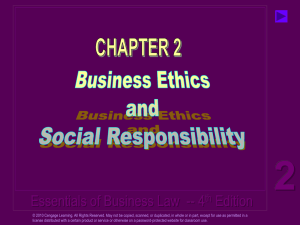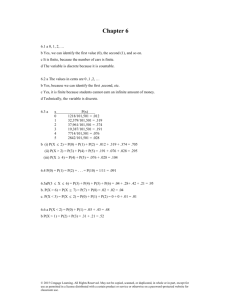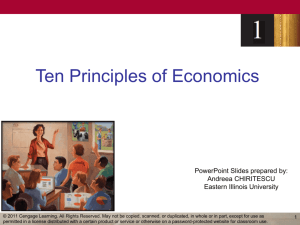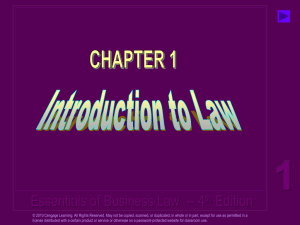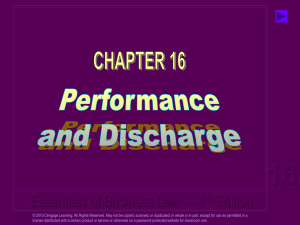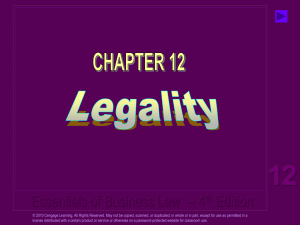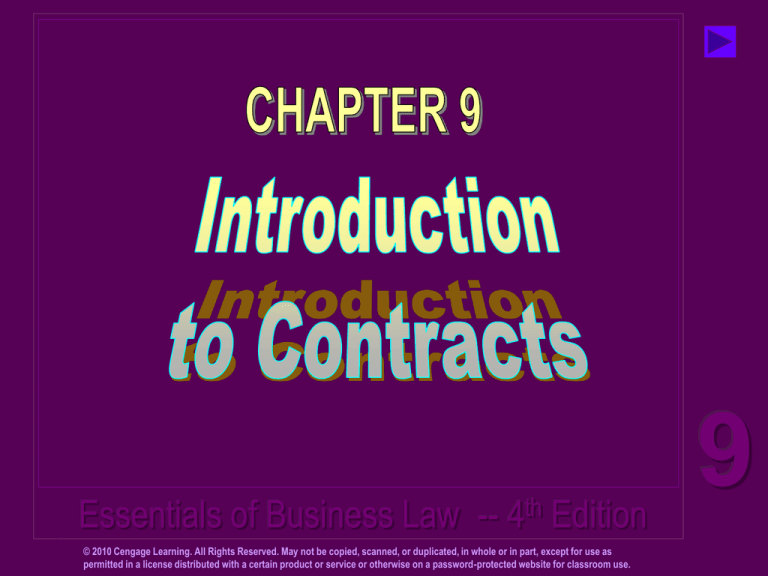
Essentials of Business Law -- 4th Edition
© 2010 Cengage Learning. All Rights Reserved. May not be copied, scanned, or duplicated, in whole or in part, except for use as
permitted in a license distributed with a certain product or service or otherwise on a password-protected website for classroom use.
9
Click your mouse
anywhere on the
screen when you are
ready to advance the
text within each slide.
After the starburst appears behind the blue
triangles, the slide is completely shown.
You may click one of the blue triangles to
move to the next slide or the previous slide.
Essentials of Business Law -- 4th Edition
© 2010 Cengage Learning. All Rights Reserved. May not be copied, scanned, or duplicated, in whole or in part, except for use as
permitted in a license distributed with a certain product or service or otherwise on a password-protected website for classroom use.
9
“The whole duty of government is to
prevent crime and to preserve
contracts.”
Lord Melbourne,
British Prime Minister
Essentials of Business Law -- 4th Edition
© 2010 Cengage Learning. All Rights Reserved. May not be copied, scanned, or duplicated, in whole or in part, except for use as
permitted in a license distributed with a certain product or service or otherwise on a password-protected website for classroom use.
9
Contracts exist to make business
matters more predictable.
Judicial Activism vs. Judicial Restraint
• Judicial restraint makes the law less
flexible but more predictable.
• Judicial activism makes the law more
flexible but less predictable.
Essentials of Business Law -- 4th Edition
© 2010 Cengage Learning. All Rights Reserved. May not be copied, scanned, or duplicated, in whole or in part, except for use as
permitted in a license distributed with a certain product or service or otherwise on a password-protected website for classroom use.
9
Agreement
• One party must make a valid offer, and the
other party must accept it
Consideration
• There has to be bargaining that leads to an
exchange between the parties.
Legality
• The contract must be for a lawful purpose.
Capacity
• The parties must be adults of sound mind.
Essentials of Business Law -- 4th Edition
© 2010 Cengage Learning. All Rights Reserved. May not be copied, scanned, or duplicated, in whole or in part, except for use as
permitted in a license distributed with a certain product or service or otherwise on a password-protected website for classroom use.
9
Consent – both sides must agree to contract.
Written form – some contracts must be written
to be enforceable.
Third party interests – the effect of the
contract on third parties must be considered.
Performance and discharge – when one party
fulfills his obligation, the duty is discharged.
Remedies – a court will award money or relief
to an injured party if a contract is broken.
Essentials of Business Law -- 4th Edition
© 2010 Cengage Learning. All Rights Reserved. May not be copied, scanned, or duplicated, in whole or in part, except for use as
permitted in a license distributed with a certain product or service or otherwise on a password-protected website for classroom use.
9
Definition
• A promise that the law will enforce.
Development of Contract Law
• Common law once required all contracts to
be in writing, with a seal affixed.
• Later, some payment was required before a
contract could be enforced.
• Mutual promises became enforceable in the
1600’s.
• By the 1900’s, courts began to consider the
fairness of contracts before enforcing them.
Essentials of Business Law -- 4th Edition
© 2010 Cengage Learning. All Rights Reserved. May not be copied, scanned, or duplicated, in whole or in part, except for use as
permitted in a license distributed with a certain product or service or otherwise on a password-protected website for classroom use.
9
Bilateral
vs. Unilateral
Express
vs. Implied
Executory
Valid
vs.
Unenforceable
vs. Voidable
vs. Executed
vs.
Void
Essentials of Business Law -- 4th Edition
© 2010 Cengage Learning. All Rights Reserved. May not be copied, scanned, or duplicated, in whole or in part, except for use as
permitted in a license distributed with a certain product or service or otherwise on a password-protected website for classroom use.
9
Bilateral and Unilateral Contracts
• Bilateral: both parties make a promise.
• Unilateral: one party makes a promise that the other
party can accept only by doing something.
Express and Implied Contracts
• Express: the two parties explicitly state all important
terms of their agreement.
• Implied: the words and conduct indicate that the
parties intended an agreement.
Executory and Executed Contracts
• Executory: one or more parties has not fulfilled its
obligations.
• Executed: all parties have fulfilled their obligations.
Essentials of Business Law -- 4th Edition
© 2010 Cengage Learning. All Rights Reserved. May not be copied, scanned, or duplicated, in whole or in part, except for use as
permitted in a license distributed with a certain product or service or otherwise on a password-protected website for classroom use.
9
Valid, Unenforceable, Voidable, and
Void Agreements
• Valid: satisfies the law’s requirements.
• Unenforceable: when the parties intend to
form a valid bargain but some rule of law
prevents enforcement.
• Voidable: when the law permits one party to
terminate the agreement.
• Void: one that neither party can enforce,
usually because the purpose is illegal or
one of the parties had no legal authority.
Essentials of Business Law -- 4th Edition
© 2010 Cengage Learning. All Rights Reserved. May not be copied, scanned, or duplicated, in whole or in part, except for use as
permitted in a license distributed with a certain product or service or otherwise on a password-protected website for classroom use.
9
Sometimes, a court needs to provide a
remedy for an injury, even if there was no
contract.
The two remedies created by judicial
activism in these situations are promissory
estoppel and quasi-contract.
• In promissory estoppel cases, the defendant
made a promise that the plaintiff relied on.
• In quasi-contract cases, the defendant did not
make any promise, but did receive a benefit from
the plaintiff.
Essentials of Business Law -- 4th Edition
© 2010 Cengage Learning. All Rights Reserved. May not be copied, scanned, or duplicated, in whole or in part, except for use as
permitted in a license distributed with a certain product or service or otherwise on a password-protected website for classroom use.
9
Even when there is no contract, a
plaintiff may use promissory estoppel to
enforce the defendant’s promise if he
can show that:
• The defendant made a promise knowing
that the plaintiff would likely rely on it.
• The plaintiff did rely on the promise; and
• The only way to avoid injustice is to enforce
the promise.
Essentials of Business Law -- 4th Edition
© 2010 Cengage Learning. All Rights Reserved. May not be copied, scanned, or duplicated, in whole or in part, except for use as
permitted in a license distributed with a certain product or service or otherwise on a password-protected website for classroom use.
9
Even when there is no contract, a court
may use quasi-contract to compensate
a plaintiff who can show that:
• He gave some benefit to the defendant.
• He reasonably expected to be paid for the
benefit and the defendant knew this; and
• The defendant would be unjustly enriched if
she did not pay.
The damages awarded are called
quantum meruit, meaning that the
plaintiff gets “as much as he deserved.”
Essentials of Business Law -- 4th Edition
© 2010 Cengage Learning. All Rights Reserved. May not be copied, scanned, or duplicated, in whole or in part, except for use as
permitted in a license distributed with a certain product or service or otherwise on a password-protected website for classroom use.
9
Common Law
Uniform Commercial Code
• UCC Article 2 governs the sale of goods.
“Goods” means anything moveable, except
for money, securities, and certain legal
rights.
• In a mixed contract, Article 2 governs only if
the primary purpose was the sale of goods.
Restatement (Second) of Contracts
Essentials of Business Law -- 4th Edition
© 2010 Cengage Learning. All Rights Reserved. May not be copied, scanned, or duplicated, in whole or in part, except for use as
permitted in a license distributed with a certain product or service or otherwise on a password-protected website for classroom use.
9
Essentials of Business Law -- 4th Edition
© 2010 Cengage Learning. All Rights Reserved. May not be copied, scanned, or duplicated, in whole or in part, except for use as
permitted in a license distributed with a certain product or service or otherwise on a password-protected website for classroom use.
9


